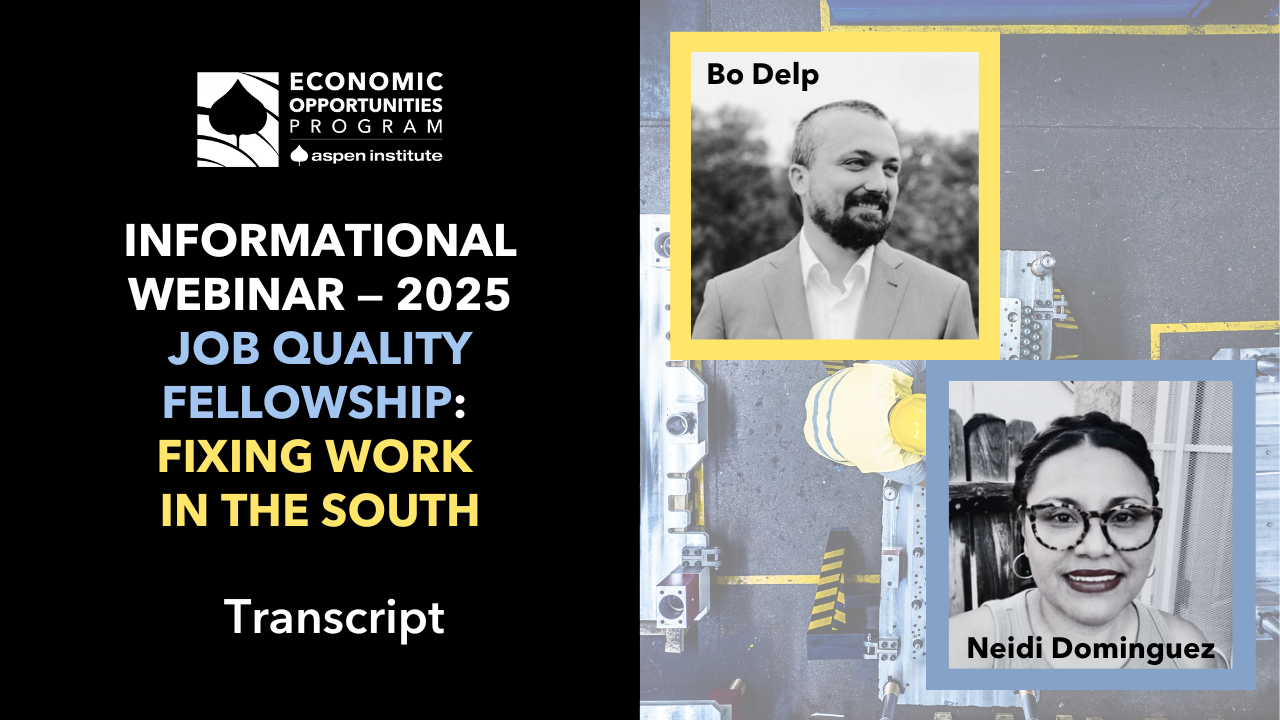Play Event Recording
LISTEN TO PODCAST
Event Description
Announcements of a big employer moving to town, or a large infrastructure project, can often spark excitement. Local communities see the potential for big benefits, including new and better jobs and other investment in community needs. Too often, however, these benefits do not materialize. Community Benefits Agreements (CBAs), binding agreements created between community groups and organizations like real estate developers or large employers, are a powerful alternative that ensure people have a real say in shaping the outcomes these new investments will create for their communities.
 Jobs to Move America (JMA) is a national leader in leveraging CBAs to improve jobs and provide opportunities for historically disadvantaged communities and workers. CBAs have allowed JMA to build consensus between affected workers and employers on policies that would benefit the community — from reformed hiring practices to improved training and protecting workers from discrimination. In this webinar, co-hosted by JMA and the Aspen Institute Economic Opportunities Program (EOP), we’ll hear from experts and practitioners about their experiences implementing CBAs and leveraging them to improve job quality in their communities. This event is part of EOP’s Job Quality in Practice series, which examines the strategies and approaches practitioners are using to improve job quality and expand economic opportunity.
Jobs to Move America (JMA) is a national leader in leveraging CBAs to improve jobs and provide opportunities for historically disadvantaged communities and workers. CBAs have allowed JMA to build consensus between affected workers and employers on policies that would benefit the community — from reformed hiring practices to improved training and protecting workers from discrimination. In this webinar, co-hosted by JMA and the Aspen Institute Economic Opportunities Program (EOP), we’ll hear from experts and practitioners about their experiences implementing CBAs and leveraging them to improve job quality in their communities. This event is part of EOP’s Job Quality in Practice series, which examines the strategies and approaches practitioners are using to improve job quality and expand economic opportunity.
Opening Remarks
Jay Mehta
Manager of Community Benefits Agreement Resource Center, Jobs to Move AmericaJay Mehta leads Jobs to Move America’s (JMA) Community Benefits Agreement Resource Center (CBARC). He began his work with JMA in December 2019 as the Senior Researcher for New Jersey and most recently served as Northeast Director, overseeing JMA’s programs in New York and New Jersey.He has 20 years of domestic and international research, campaign and election-related experience. Jay previously worked for the UNITE HERE Union, where he was successful in raising standards, organizing opportunities and developing key community and political stakeholder relationships for hotel, airport and casino workers throughout North America. Following his time with the union, Jay also served as an issue and opposition researcher for the Working Families Party and directly prior to joining JMA, worked as an independent research and creative consultant.Jay received his Bachelors in Philosophy and Religion from Flagler College (‘02) in St. Augustine, Florida and a Masters in Diplomacy, Law and Global Change from Coventry University in England (‘03).
Speakers
 Erica Iheme
Erica Iheme
Co-Executive Director, Jobs to Move America
Erica Iheme (e-ham-a) is the Co-Executive Director for Jobs to Move America. She is an educator, organizer and strategic researcher. Erica earned both her Bachelor’s and Master’s degrees in Urban Planning from Alabama A&M, a Historically Black University (HBCU) based in Normal, Alabama.
Erica spent the past 17 years building unions as an organizer all over America in several industries including hospitals, public sector, head starts, higher education, and homecare. During her time in academia, Erica focused her energy on university administration and research. Outside of organizing and research, Erica is a mother, artist, and community builder.
 Amanda Woodrum
Amanda Woodrum
Co-Director, ReImagine AppalachiaAmanda Woodrum is Co-Director for ReImagine Appalachia, focusing on issues found at the intersection of health, energy, equity and the economy. After living in New York City and experiencing 9/11, she returned to Ohio determined to make the state the kind of place she wanted to live. She joined Policy Matters Ohio in 2007 after receiving a master’s degree in economics and a law degree from the University of Akron. She conducts research on the role transportation, energy, health and anti-poverty policy can play to promote a more sustainable and equitable economy in Ohio.

Grace Adcox
Senior Climate Strategist, Data for Progress
Grace Adcox is the senior climate strategist at Data for Progress (DFP). At DFP, she leads climate polling and message testing research, using data to support movement partners advancing climate action at the city, state, and federal levels, and to ensure the equitable deployment of community-centered climate infrastructure under federal climate policies. Grace formerly served as assistant director of the Research on Conflict and Collective Action Lab at Vanderbilt University, carrying out multidisciplinary research projects on political violence, protest, and social movements.
Moderator
 Matt Helmer
Matt Helmer
Managing Director, Economic Opportunities Program, The Aspen Institute
Matt Helmer is the managing director at the Aspen Institute Economic Opportunities Program and re-joined the program in April 2022. Matt’s work focuses on developing research, conversations, narratives, and tools that advance job quality, economic security, and race and gender equity for workers with low- and moderate-incomes. Matt helps curate EOP’s Opportunity in America discussion series, oversee the Job Quality Center of Excellence, and lead EOP’s work on employee ownership. He also facilitates leadership development programs and manages various research projects. Matt is the author of numerous research publications, issue briefs, case studies, and book chapters. His writing has been featured in The Hill and Fast Company. He worked for the Institute’s Workforce Strategies Initiative (WSI) from 2009 to 2014. With WSI, Matt researched community college and nonprofit partnerships and construction pre-apprenticeship and apprenticeship programs, facilitated the Sector Skills Academy, and supported the Reinventing Low-Wage Work and Working in America discussion series.
Before rejoining the Institute in 2022, Matt worked for the Seattle Housing Authority (SHA), where he led a team of analysts and project managers charged with advancing the agency’s strategic priorities. Matt helped lead the development and implementation of workforce development and asset building programs, eviction prevention strategies, and trauma-informed practice Before joining SHA, Matt was a senior policy analyst at the Seattle Jobs Initiative, where he evaluated workforce development programs and conducted research on job quality and economic development issues in the Seattle region. Prior to coming to the Institute in 2009, Matt worked for a local nonprofit in Seattle supporting immigrants and refugees, served in Damascus as a senior English language fellow for the US State Department, and was a Peace Corps Volunteer in Tonga. He has bachelor’s and master’s degrees in teaching English to speakers of other languages from Southern Illinois University and a master’s degree in public administration from the University of Washington. Matt lives outside Seattle with his wife and two sons and enjoys spending time with them exploring the beaches, mountains, and forests of the Pacific Northwest.
Learn More
This event is part of the Job Quality in Practice webinar series, hosted by the Aspen Institute Economic Opportunities Program. In this series, we provide actionable tools and guidance to support leaders across geographies and fields – including workforce development, economic development, capital deployment, policy, worker advocacy, business, and higher education – to engage in practical action to improve jobs in their local communities and connect to a growing national conversation.The Aspen Institute Economic Opportunities Program hosts a variety of discussions to advance strategies, policies, and ideas to help low- and moderate-income people thrive in a changing economy. To learn about upcoming events and webinars, join our mailing list and follow us on social media.
Play Event Recording
LISTEN TO PODCAST
Event Description
Announcements of a big employer moving to town, or a large infrastructure project, can often spark excitement. Local communities see the potential for big benefits, including new and better jobs and other investment in community needs. Too often, however, these benefits do not materialize. Community Benefits Agreements (CBAs), binding agreements created between community groups and organizations like real estate developers or large employers, are a powerful alternative that ensure people have a real say in shaping the outcomes these new investments will create for their communities.
 Jobs to Move America (JMA) is a national leader in leveraging CBAs to improve jobs and provide opportunities for historically disadvantaged communities and workers. CBAs have allowed JMA to build consensus between affected workers and employers on policies that would benefit the community — from reformed hiring practices to improved training and protecting workers from discrimination. In this webinar, co-hosted by JMA and the Aspen Institute Economic Opportunities Program (EOP), we’ll hear from experts and practitioners about their experiences implementing CBAs and leveraging them to improve job quality in their communities. This event is part of EOP’s Job Quality in Practice series, which examines the strategies and approaches practitioners are using to improve job quality and expand economic opportunity.
Jobs to Move America (JMA) is a national leader in leveraging CBAs to improve jobs and provide opportunities for historically disadvantaged communities and workers. CBAs have allowed JMA to build consensus between affected workers and employers on policies that would benefit the community — from reformed hiring practices to improved training and protecting workers from discrimination. In this webinar, co-hosted by JMA and the Aspen Institute Economic Opportunities Program (EOP), we’ll hear from experts and practitioners about their experiences implementing CBAs and leveraging them to improve job quality in their communities. This event is part of EOP’s Job Quality in Practice series, which examines the strategies and approaches practitioners are using to improve job quality and expand economic opportunity.
Opening Remarks
Jay Mehta
Manager of Community Benefits Agreement Resource Center, Jobs to Move AmericaJay Mehta leads Jobs to Move America’s (JMA) Community Benefits Agreement Resource Center (CBARC). He began his work with JMA in December 2019 as the Senior Researcher for New Jersey and most recently served as Northeast Director, overseeing JMA’s programs in New York and New Jersey.He has 20 years of domestic and international research, campaign and election-related experience. Jay previously worked for the UNITE HERE Union, where he was successful in raising standards, organizing opportunities and developing key community and political stakeholder relationships for hotel, airport and casino workers throughout North America. Following his time with the union, Jay also served as an issue and opposition researcher for the Working Families Party and directly prior to joining JMA, worked as an independent research and creative consultant.Jay received his Bachelors in Philosophy and Religion from Flagler College (‘02) in St. Augustine, Florida and a Masters in Diplomacy, Law and Global Change from Coventry University in England (‘03).
Speakers
 Erica Iheme
Erica Iheme
Co-Executive Director, Jobs to Move America
Erica Iheme (e-ham-a) is the Co-Executive Director for Jobs to Move America. She is an educator, organizer and strategic researcher. Erica earned both her Bachelor’s and Master’s degrees in Urban Planning from Alabama A&M, a Historically Black University (HBCU) based in Normal, Alabama.
Erica spent the past 17 years building unions as an organizer all over America in several industries including hospitals, public sector, head starts, higher education, and homecare. During her time in academia, Erica focused her energy on university administration and research. Outside of organizing and research, Erica is a mother, artist, and community builder.
 Amanda Woodrum
Amanda Woodrum
Co-Director, ReImagine AppalachiaAmanda Woodrum is Co-Director for ReImagine Appalachia, focusing on issues found at the intersection of health, energy, equity and the economy. After living in New York City and experiencing 9/11, she returned to Ohio determined to make the state the kind of place she wanted to live. She joined Policy Matters Ohio in 2007 after receiving a master’s degree in economics and a law degree from the University of Akron. She conducts research on the role transportation, energy, health and anti-poverty policy can play to promote a more sustainable and equitable economy in Ohio.

Grace Adcox
Senior Climate Strategist, Data for Progress
Grace Adcox is the senior climate strategist at Data for Progress (DFP). At DFP, she leads climate polling and message testing research, using data to support movement partners advancing climate action at the city, state, and federal levels, and to ensure the equitable deployment of community-centered climate infrastructure under federal climate policies. Grace formerly served as assistant director of the Research on Conflict and Collective Action Lab at Vanderbilt University, carrying out multidisciplinary research projects on political violence, protest, and social movements.
Moderator
 Matt Helmer
Matt Helmer
Managing Director, Economic Opportunities Program, The Aspen Institute
Matt Helmer is the managing director at the Aspen Institute Economic Opportunities Program and re-joined the program in April 2022. Matt’s work focuses on developing research, conversations, narratives, and tools that advance job quality, economic security, and race and gender equity for workers with low- and moderate-incomes. Matt helps curate EOP’s Opportunity in America discussion series, oversee the Job Quality Center of Excellence, and lead EOP’s work on employee ownership. He also facilitates leadership development programs and manages various research projects. Matt is the author of numerous research publications, issue briefs, case studies, and book chapters. His writing has been featured in The Hill and Fast Company. He worked for the Institute’s Workforce Strategies Initiative (WSI) from 2009 to 2014. With WSI, Matt researched community college and nonprofit partnerships and construction pre-apprenticeship and apprenticeship programs, facilitated the Sector Skills Academy, and supported the Reinventing Low-Wage Work and Working in America discussion series.
Before rejoining the Institute in 2022, Matt worked for the Seattle Housing Authority (SHA), where he led a team of analysts and project managers charged with advancing the agency’s strategic priorities. Matt helped lead the development and implementation of workforce development and asset building programs, eviction prevention strategies, and trauma-informed practice Before joining SHA, Matt was a senior policy analyst at the Seattle Jobs Initiative, where he evaluated workforce development programs and conducted research on job quality and economic development issues in the Seattle region. Prior to coming to the Institute in 2009, Matt worked for a local nonprofit in Seattle supporting immigrants and refugees, served in Damascus as a senior English language fellow for the US State Department, and was a Peace Corps Volunteer in Tonga. He has bachelor’s and master’s degrees in teaching English to speakers of other languages from Southern Illinois University and a master’s degree in public administration from the University of Washington. Matt lives outside Seattle with his wife and two sons and enjoys spending time with them exploring the beaches, mountains, and forests of the Pacific Northwest.
Learn More
This event is part of the Job Quality in Practice webinar series, hosted by the Aspen Institute Economic Opportunities Program. In this series, we provide actionable tools and guidance to support leaders across geographies and fields – including workforce development, economic development, capital deployment, policy, worker advocacy, business, and higher education – to engage in practical action to improve jobs in their local communities and connect to a growing national conversation.The Aspen Institute Economic Opportunities Program hosts a variety of discussions to advance strategies, policies, and ideas to help low- and moderate-income people thrive in a changing economy. To learn about upcoming events and webinars, join our mailing list and follow us on social media.










